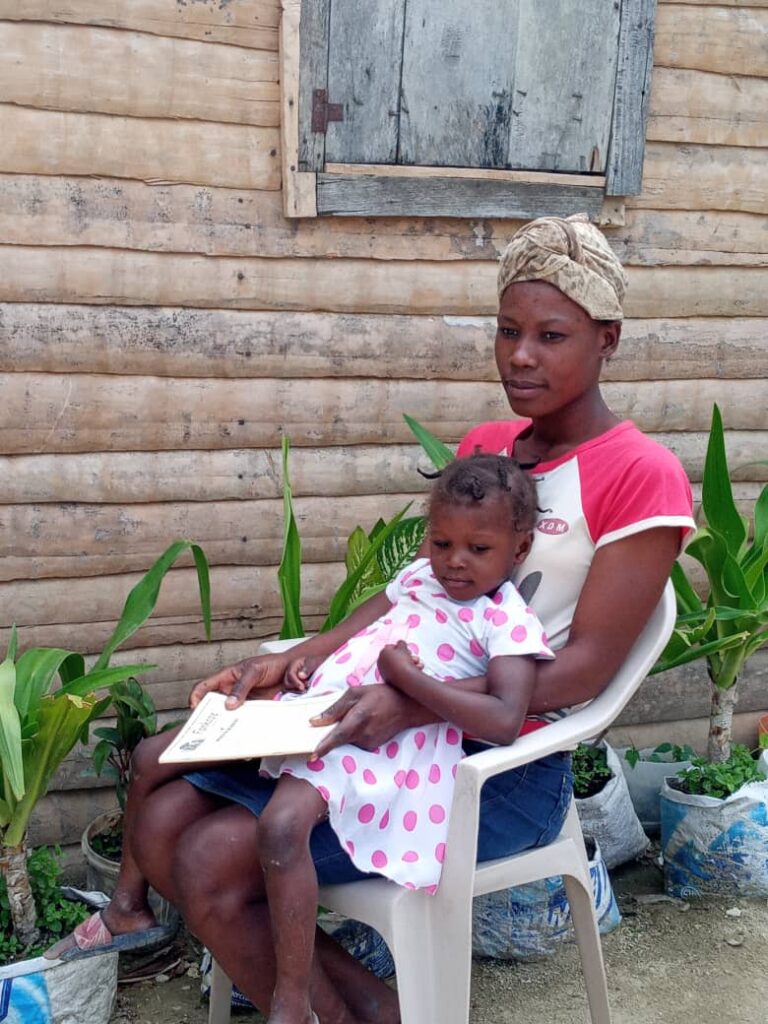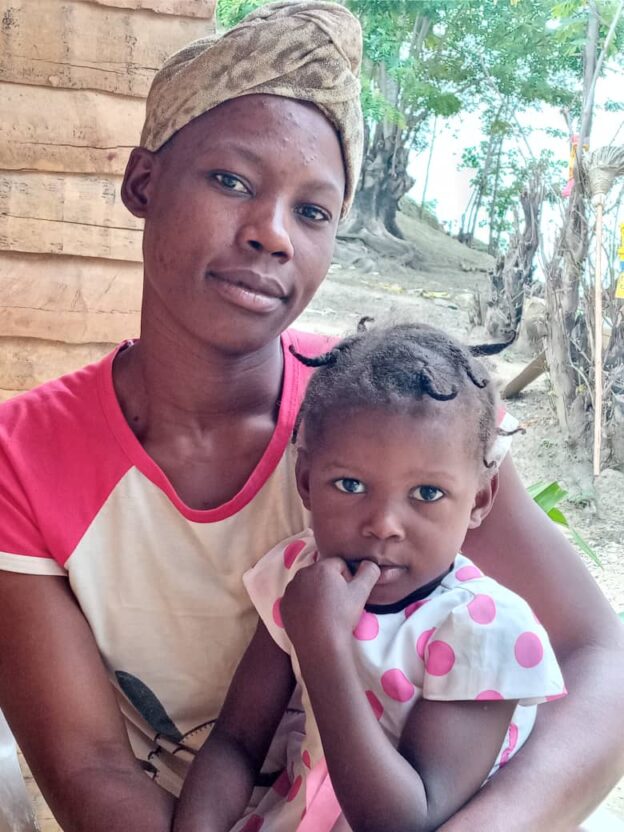Delène and her partner, Richard, live with the couple’s two girls in Mòn Tomond. The land they live on belongs to her mother-in-law, but Delène says that that’s okay because the older woman is happy to have them there. Delène’s oldest girl lives in Pòtoprens with the girl’s father. Delène doesn’t often talk with her, but she makes sure she gets news.
Back before their children were born, when Delène and Richard had more money, they bought a house, dismantled it, and had it re-constructed on the property. The roof already leaked back then, but it was all they could afford.
When she joined the program, Delène had a small business selling laundry products, such as detergent and soap. A bigger merchant would give her merchandise on credit, and she would pay after her sales, before she took more merchandise. She would generally buy for about 3000 gourds and could make as much as 500 gourds of profit. She eventually gave uptake business, however, because it didn’t seem worth it. “I was making less and less. There are too many merchants. Someone would put their stuff on sale, so I wouldn’t be able to sell mine.”
Her husband contributed and continues to contribute to the household by farming land that belongs to his mother and by working in neighbors’ fields. When there was no field work to be done, the couple would make and sell charcoal.
She should have 15 months in the program by now, but she joined three months late, when another member dropped out. This is not unusual. A small number of each of the groups that start in the program give it up for one reason or another. Almost all such cases involve someone deciding to leave the community she lives in. We try to replace the departing member if we can, especially if she leaves in the first six months or so. These new families may or may not have time to do all they need to do to qualify for graduation, but they can make a lot of progress.
Delène was living very close to other CLM members, so she should have been part of the cohort from the beginning, so it’s important to understand how the team missed her during the selection process. It wasn’t for lack of trying. Her name was on the list we used for preliminary selection, and staff visited her home, looking to talk with her, several times. They simply couldn’t find her. “I was never around. Either I was off with my business or doing my laundry. I’d hear that someone had come by, but they never came when I was here.”
It was frustrating to see some of her neighbors get help she thought she needed. “It hurt, but I just prayed.”
Once Delène joined CLM, she got to work. She asked for goats and a pig, and her goats in particular have done well. We gave her two, and now she has seven. She bought one of the seven with proceeds from the sale of meat from her pig, which had died.
She would have eight goats, but one of her goats died, as well. When animals die suddenly, rural Haitians will sometimes be willing to consume the meat. It depends on a number of factors. But they won’t usually pay cash for it. They’ll buy it on credit, setting a date by which they’ll pay. The seller doesn’t have much leverage. If they don’t sell the meat quickly, it will spoil, and they’ll get nothing. So, Delène expects 3250 gourds from the sale, but she won’t get it until May.
This money is important to her because she wants to get back into business. She just doesn’t want to return to buying laundry products on credit. She’d like to use her own capital, and she thinks the goat-money will give her what she needs. She doesn’t know what she wants to sell, though. She just know she wants to be back in business.
She has plans for the goats that are still alive, too. She is a part of a savings and loan association that will complete its cycle in May, and she’ll receive a pay-out of all she saved during the year, plus interest. “My case manager, Esther, says that she’ll take the money from the association, sell some of the goats, and buy me a cow with the money.”
This is, in a way, a perfectly good plan. A rural Haitian family like Delène’s can only take care of so many goats. Keeping a large number well-fed can be difficult. And she and Richard would like to have a cow. Owning a cow gives you a different status in a rural Haitian neighborhood, and income from the sale of calves can help you accumulate land.
But the way Delène frames the plan is troubling. She describes it as something her case manager will do for her. She’s excited about it, but she seems to view herself less as the principal agent of the plan and more as its beneficiary.
This is an important coaching point. As long as CLM members see themselves as beneficiaries, as interested spectators, in the program’s work, it is difficult to believe in the progress they make. Our team will be gone after 18 months, and the family will be on its own.
So Esther and the other staff members who work with Delène have some work to do. We need to help Delène recognize that she is the engine driving her success. She and Richard managed the rapid construction of a small, secure new home. She and Richard are taking care of their growing collection of goats. She and Richard handle their planting and plan how they will send both children to school in the fall. Even the plan to buy a cow, which she currently frames as Esther’s contribution, was really her own idea. She just needs the confidence to see it that way.

